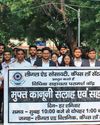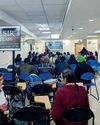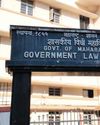
Q. What major developments did the Digital University see in the past one year?
A. The major advancement was in the area of research. We could actually set up two large centres of excellence (CoE), both national centres. One is on the internet of things (IOT) and the other, on graphene [a nanomaterial]. This year, in the graphene centre, we are providing scholarships for M.Tech students interested to work in a related area.
The key model we have adopted is that we bring lots of projects in both research and development from industry and provide students the opportunity to work and earn through them. They can recoup at least around 50 percent of the fees they paid and, along with their classroom training, they also get handson training in the campus itself.
We had good PhD admissions. The university is almost self-sustaining, from its own internal projects and other grants. We provide scholarships of Rs 20,000 per month in the first year and Rs 25,000 per month in the second year for all PhD students. We don't charge anything from PhD students. If they are not interested, they have other proje For M.Tech, we have the earnwhile-learn programme in which they can participate in the live projects of the university. Around 25 percent of M.Tech students have full scholarships now.
Q. You had said that the aim is to depend on student fees for just 40 to 50 percent of the university's funds. Are you on the right path?
A. If I look at my last year's budget, only 30 percent is coming from fees and government grants, 70 percent we generated through our other projects. Moving further, we will actually look more into that area. We want to make the courses affordable. Although they would still have to pay the fee, we are looking at making it almost free for students with subsidies from projects.
This story is from the {{IssueName}} edition of {{MagazineName}}.
Start your 7-day Magzter GOLD free trial to access thousands of curated premium stories, and 9,000+ magazines and newspapers.
Already a subscriber ? Sign In
This story is from the {{IssueName}} edition of {{MagazineName}}.
Start your 7-day Magzter GOLD free trial to access thousands of curated premium stories, and 9,000+ magazines and newspapers.
Already a subscriber? Sign In

Sleeper Cells: Law schools' 'dormant' legal aid clinics
A law college survey by the Supreme Court's policy centre found that a worrying number of legal aid clinics do little more than hold legal awareness camps, despite NALSA, BCI rules. This leaves gaps in legal education

Law's new niche frontiers
How niche law programmes are blending science with legal expertise, transforming legal education and creating specialised career paths

'GP Sir's classes' a ray of hope for the poor
Shrishti (name changed), 31, hails from the Valmiki community based in Gurdaspur, Punjab; she was born into a family of safai karamcharis - cleaners and at 21, married into another.

DU Law Faculty is part of CLAT 2025 but plans own exam: Dean
Delhi University's Faculty of Law will admit to its BBA LLB and BA LLB courses through the CLAT exam this year.

Studying law through films, novels, comics
Law schools are using various art forms - films, comics, theatre, puppetry

Legal education meets AI
As artificial intelligence reshapes industries, India’s leading law schools are introducing specialised courses and research initiatives, often in collaboration with technical institutions. But the need for comprehensive regulations persists

A LEGACY IN CRISIS
Asia's oldest law college and alma mater to legal luminaries, Government Law College, Mumbai, now grapples with declining standards, administrative apathy, and students' shifting educational aspirations

Law Colleges for 2025
Careers360 has ranked 100 law colleges and rated over 185 institutions, categorising them into distinct zones and states, for a comprehensive overview of legal education

IIT Madras introduces another quota
After admitting five students via the sports quota in 2024-25 - a first among the IITs Indian Institute of Technology Madras has now introduced another quota for \"fine arts and culture excellence\".

CLAT answer keys and court cases
Many Common Law Admission Test (CLAT) candidates claimed to find mistakes in its provisional and final answer keys.